
Subscribe
eNewsletter

Ready to get certified?
Free CDCES Coach App
Download
Free Med Pocket Cards

eNewsletter

Free CDCES Coach App
Free Med Pocket Cards
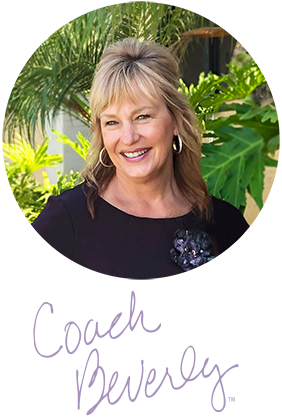
When I started in diabetes, we had two injectables, NPH and regular insulin. Fast forward to last month, the FDA evaluated the safety and efficacy of a once-a-week basal insulin called icodec. Citing safety reasons, the FDA denied the approval of icodec for people living with type 1 diabetes based on the data results. While researching this article, I discovered a concerning statistic: about 30% of people with type 1 still use multiple daily injections, especially in under-resourced communities. This statistic highlights the significant gap in access to diabetes technology and access in the U.S., and I consider it a call to action. In addition to detailing icodec insulin in this newsletter, we explore BMI as a health indicator and contemplate if communities would benefit from a more predictive and less stigmatized weight assessment. We prepare for the updated CDCES exam and highlight the significant changes starting July 1st. These changes reflect crucial knowledge needed to promote the best diabetes care. You are invited to check out our targeted resources to support CDCES success and promote excellence in diabetes care. With summer around the corner, we provide strategies to help people move forward with their activity goals and PLAN for setbacks. Plus, we have created a handy activity cheat sheet. Lastly, we are excited to announce that we are opening up the first session of ReVive 5 for FREE. This is a unique opportunity for you to join two experts in the field as they provide concrete strategies to evaluate and address diabetes distress. The session is designed to provide valuable support and care, and we believe it’s an opportunity you won’t want to miss. Our San Diego Scholarships are still open, and we would love to see you at this fun and intensive conference. This is a valuable experience to enhance your knowledge and skills in diabetes care, and we encourage you to consider applying. |
Sending notes of joy and health, Coach Beverly, Bryanna, and Christine |
Featured Articles
Upcoming Webinars

This two-session training provides the essential steps to address diabetes distress combined with an innovative approach to helping people make sense of their glucose data.
The first session is team-taught by experts in the field of diabetes distress and effective communication approaches. Dr. Larry Fisher kicks off the program by describing the difference between depression and distress and interpreting Diabetes Distress screening results. Dr. Susan Guzman uses a case study approach and step-by-step communication strategies to address responses from the Diabetes Distress screening tool. This session includes an abundance of evidence-based approaches that you can apply in your clinical setting.
Coach Beverly leads the second session. During this three-hour program, Beverly describes insulin dosing strategies, meter and sensor data interpretation, and common issues encountered by people using diabetes technology. Case studies include tools to help individuals discover what changes are needed to get glucose to target, coupled with the communication skills discussed in the first session. In conclusion, the team of instructors review a case study that pulls together all the ReVive 5 elements.
Can’t join live? That’s okay. Your registration guarantees you access to the recorded version of the series, along with podcasts and resources for one full year.
Accredited Training Program:
Join us to gain the confidence and learn the skills needed to support people with diabetes to move forward in their self-management and discover the expert within.
Team of Experts:
ReVive 5 is taught by a team of 3 Interdisciplinary Experts:
Accreditation: Diabetes Education Services is an approved provider by the California Board of Registered Nursing, Provider 12640, and our CPEU courses have received Prior Approval* from the Commission of Dietetic Registration (CDR), Provider DI002. Since our CPEU courses received Prior approval* from the CDR, these CPEU courses satisfy the CE requirements for the CDCES /BC-ADM regardless of your profession!
The use of DES products does not guarantee the successful passage of the certification exam. CBDCE and ADCES do not endorse any preparatory or review materials for the CDCES or BC-ADM exams, except for those published by CBDCE & ADCES.
For last week’s practice question, we quizzed participants on what is the cause of LS’ ER visit based on lab results. 61% of respondents chose the best answer. We want to clarify and share this important information, so you can pass it on to people living with diabetes and your colleagues, plus prepare for exam success!
Before we start though, if you don’t want any spoilers and haven’t tried the question yet, you can answer it below: Answer Question

Question: LS is a 29-year-old who arrives in the emergency room with known history of type 2 diabetes. BMI is 23.9 and they are on basal insulin therapy and an oral medication to help “clear extra sugar”. On admission, their blood glucose is 189, pH is 7.2 and LS has 3+ betahydroxybyturate.
What is the most likely cause of these lab results?
Answer Choices:
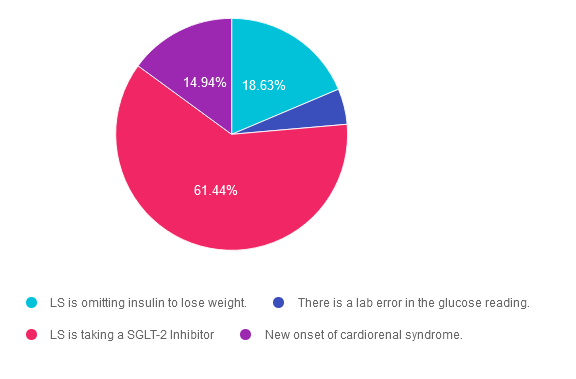
Answer 1 is incorrect. 18.63% chose this answer. “LS is omitting insulin to lose weight.” Although this answer is tempting since LS has ketosis and acidosis, it doesn’t explain why the glucose level is so low. With insulin omission, the person would present in ketoacidosis with a blood sugar of 200 or greater. In addition, the question mentions that LS is taking a diabetes pill to help release the sugar through her urine. This is an important clue to get to the best answer.
Answer 2 is incorrect. 4.98% of you chose this answer. “There is a lab error in the glucose reading.” Since LS has ketosis and acidosis, it is confusing as to why the glucose level is so low. With insulin omission, the person would present in ketoacidosis with a blood sugar of 200 or greater. The question also mentions that LS is taking a diabetes pill to help release the sugar through her urine. This is an important clue to get to the best answer.
Answer 3 is correct. About 61.44% of respondents chose this. “LS is taking a SGLT-2 Inhibitor.” GREAT JOB. This is the best answer. LS has ketosis and acidosis, with a glucose level less than 200. Given her history, this meets the criteria for euglycemic DKA. Since the question mentions that LS is taking a diabetes pill to help release the sugar through her urine, this important clue gets us to the best answer. LS is taking a SGLT-2 inhibitor, which can lead to euglycemic DKA, especially during periods of illness or if they are not taking adequate insulin.
Finally, Answer 4 is incorrect. 14.94% chose this answer. “New onset gastroparesis.” This answer doesn’t really explain why LS is experiencing acidosis and ketosis. Many people with new onset gastroparesis struggle with post meal hypoglycemia and erratic blood sugar levels, but they do not generally struggle with euglycemic DKA. The question also mentions that LS is taking a diabetes pill to help release the sugar through her urine. This is an important clue to get to the best answer.
We hope you appreciate this week’s rationale! Thank you so much for taking the time to answer our Question of the Week and participate in this fun learning activity!

Join Coach Beverly and Team for two and a half days of knowledge-sharing, fun, networking, games with prizes, and “aha” moments in beautiful San Diego on October 9-11, 2024.
You don’t want to miss this one-of-a-kind learning opportunity. Get away from all those daily responsibilities and immerse yourself in a fun and intensive conference with plenty of networking opportunities.
Attendees will leave this conference with new tools and a more complete understanding of the latest advances in diabetes care, from medications to technology to Medical Nutrition Therapy!
Each day, we provide a healthy breakfast, including fresh coffee, to kick off your morning. Our instructors co-teach the content to keep things fresh and lively. Plus, we play DiaBingo to reinforce key content and give away prizes. In addition, we provide plenty of movement breaks led by volunteers from the audience. Did we mention delicious lunches and a conference meeting space just minutes from San Diego Bay?
Friend Discount: 3 or more only $559-$799 (based on registration package) per person. Email us at [email protected] with the name and email of each registrant to get the discount!
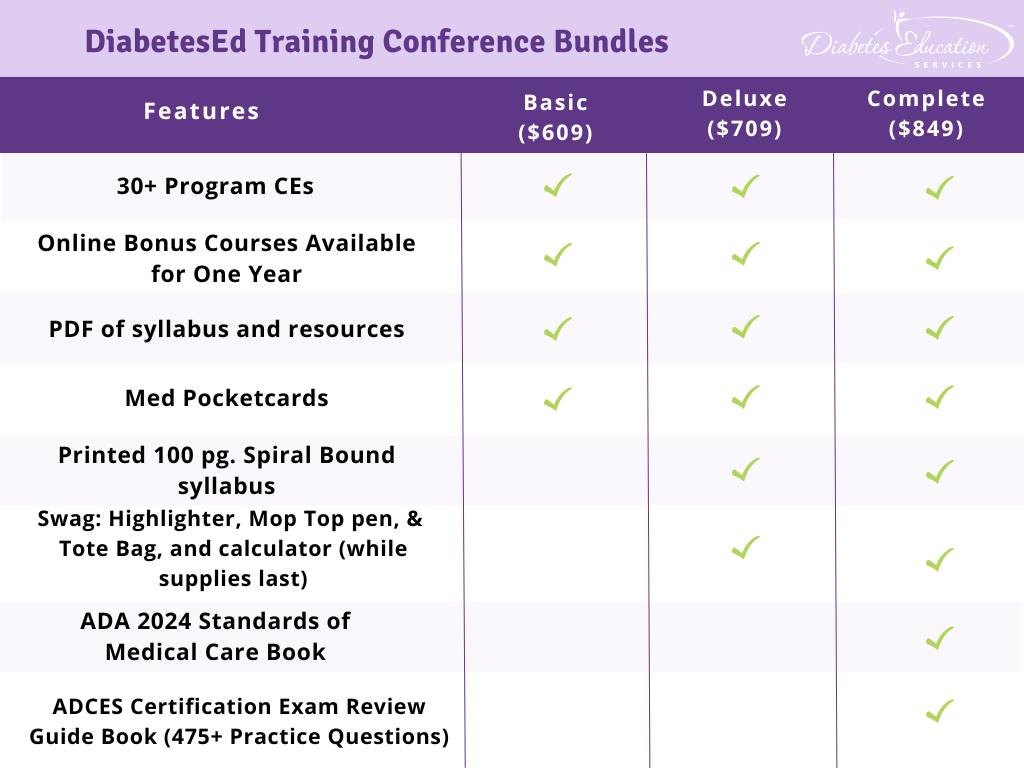
Time: The course is Wednesday through Friday. Join us for breakfast at 7:00 a.m. each day. The class begins at 8:00 a.m. and ends at 5:00 p.m. on Wednesday and Thursday and at 3:00 p.m. on Friday.
Accreditation: Diabetes Education Services is an approved provider by the California Board of Registered Nursing, Provider 12640, and our CPEU courses have received Prior Approval* from the Commission of Dietetic Registration (CDR), Provider DI002. Since our CPEU courses received Prior approval* from the CDR, these CPEU courses satisfy the CE requirements for the CDCES /BC-ADM regardless of your profession!
The use of DES products does not guarantee the successful passage of the certification exam. CBDCE and ADCES do not endorse any preparatory or review materials for the CDCES or BC-ADM exams, except for those published by CBDCE & ADCES.

LS has type 1 diabetes and is here for the first visit after confirmation of pregnancy. LS has been using non-adjunctive continuous glucose monitoring (CGM) along with insulin pump therapy to manage diabetes. Previous visits have focused on preconception counseling and last A1c was 6.4%.
According to the 2024 ADA Standards of Care, what do we recommend regarding glucose monitoring during pregnancy?

Pregnancy with diabetes is confronted with a variety of issues that require special attention, education, & understanding. This course reviews those special needs while focusing on Gestational Diabetes & Pre-Existing Diabetes. Included are the most recent diagnostic criteria, management goals, & prevention of complications during pregnancy. This is a helpful review for Certification Exams & those who want more information on people who are pregnant & live with diabetes.
Objectives:
Learning Outcome:
Participants will gain knowledge of special considerations, individualized goals, and standards for people experiencing diabetes during pregnancy to improve outcomes.
Target Audience:
This course is a knowledge-based activity designed for individuals or groups of diabetes professionals, including RNs, RDs/RDNs, Pharmacists, Nurse Practitioners, Clinical Nurse Specialists, Physician Assistants, and other healthcare providers interested in staying up to date on current practices of care for people with prediabetes, diabetes, and other related conditions. The practice areas for RDs/RDNs for CDR reporting are healthcare, preventative care, wellness, and, lifestyle along with, education and research.
CDR Performance Indicators:
Instructor: Beverly Thomassian RN, MPH, CDCES, BC-ADM is a working diabetes specialist and a nationally recognized diabetes expert.
Accreditation: Diabetes Education Services is an approved provider by the California Board of Registered Nursing, Provider 12640, and our CPEU courses have received Prior Approval* from the Commission of Dietetic Registration (CDR), Provider DI002. Since our CPEU courses received Prior approval* from the CDR, these CPEU courses satisfy the CE requirements for the CDCES /BC-ADM regardless of your profession!
The use of DES products does not guarantee the successful passage of the certification exam. CBDCE and ADCES do not endorse any preparatory or review materials for the CDCES or BC-ADM exams, except for those published by CBDCE & ADCES.

With summer in the air, it’s a perfect time to take a fresh approach to explore what activities people enjoy most and help them take that first step forward!
The majority of people with diabetes are aware that regular activity is integral to diabetes self-care and helps lower blood sugars for 24 -48 hours. However, getting started and maintaining momentum can be tough. With thoughtful coaching, we can support them to make progress toward the target of 150 minutes of walking (or other activity) a week coupled with strength training.
Coach Beverly has outlined five strategies that she has found helpful in encouraging people to move more.
Getting started with regular activity can seem daunting for many people. We can help lift that fear by encouraging them to start with baby steps and substitute the term “activity” for “exercise”. Reassuring people that “any movement is better than no movement” allows them to shift their perspective and give themselves credit for something as simple as walking to the mailbox.
The goal is to accumulate about thirty minutes of activity a day, so taking a 10-minute walk after breakfast means they are one-third of the way there. Other activities that count include; gardening, housework, yard work, shopping, chasing kids, and those dance moves people do when no one is looking.
Even the best-made plans to increase activity may go differently than envisioned. A person-centered collaborative approach can help people get moving, one step at a time. Anticipating setbacks helps create realistic expectations and PLAN strategies to get restarted. As diabetes specialists, we can prepare people for obstacles and remind them that a falter does not equal failure. According to Sylvia Gonsahn Bollie, MD, assisting individuals in preparing for barriers with a PLAN helps toward a quicker recovery.
 – Ponder what happened.
– Ponder what happened.In addition to having a PLAN, encourage people to avoid black-and-white thinking, like, “Well, I missed my planned workout, so I might as well just give up.”
Suggest a reframe of the internal messaging and instead say, “I missed my planned workout today, and that is okay. I will get back on track starting tomorrow.”
Supporting gentle, nonjudgmental, self-compassionate coaching can help people feel better about their efforts and increase their success with behavior change goals.
These simple sentences capture people’s attention and help them take that first step toward more movement. Please feel free to borrow and use these sayings in your practice!
 Walking for 10 minutes after meals can help lower post-meal blood sugar levels.
Walking for 10 minutes after meals can help lower post-meal blood sugar levels.Regular physical activity can help prevent disease and improve well-being. Although less than 50% of people are reaching the activity goals, improvement is possible. As health advocates, we can encourage systemic changes in health care and environmental changes in our neighborhoods to increase population activity.
Cheat Sheet compliments of www.DiabetesEd.net
Starting and keeping new habits is challenging. By integrating activity into everyday life, people are likelier to keep it up. If the movement brings them joy, that is an added benefit. An excellent starting strategy is asking them what activities they like. Then explore if they can add it to their typical day. For example, taking a walk during a lunch break or hitting the gym before heading home. What about lifting weights with the kids or helping with after-dinner cleanup instead of relaxing in that favorite comfy chair? Joining an organized sport or dance class is also an option.
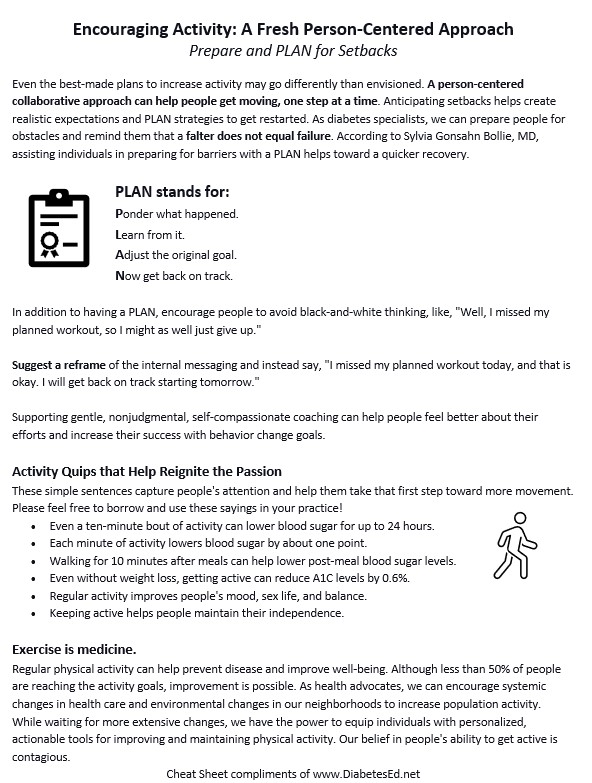

This two-session training provides the essential steps to address diabetes distress combined with an innovative approach to helping people make sense of their glucose data.
The first session is team-taught by experts in the field of diabetes distress and effective communication approaches. Dr. Larry Fisher kicks off the program by describing the difference between depression and distress and interpreting Diabetes Distress screening results. Dr. Susan Guzman uses a case study approach and step-by-step communication strategies to address responses from the Diabetes Distress screening tool. This session includes an abundance of evidence-based approaches that you can apply in your clinical setting.
Coach Beverly leads the second session. During this three-hour program, Beverly describes insulin dosing strategies, meter and sensor data interpretation, and common issues encountered by people using diabetes technology. Case studies include tools to help individuals discover what changes are needed to get glucose to target, coupled with the communication skills discussed in the first session. In conclusion, the team of instructors review a case study that pulls together all the ReVive 5 elements.
Can’t join live? That’s okay. Your registration guarantees you access to the recorded version of the series, along with podcasts and resources for one full year.
Accredited Training Program:
Team of Experts:
ReVive 5 is taught by a team of 3 Interdisciplinary Experts:
Accreditation: Diabetes Education Services is an approved provider by the California Board of Registered Nursing, Provider 12640, and our CPEU courses have received Prior Approval* from the Commission of Dietetic Registration (CDR), Provider DI002. Since our CPEU courses received Prior approval* from the CDR, these CPEU courses satisfy the CE requirements for the CDCES /BC-ADM regardless of your profession!
The use of DES products does not guarantee the successful passage of the certification exam. CBDCE and ADCES do not endorse any preparatory or review materials for the CDCES or BC-ADM exams, except for those published by CBDCE & ADCES.

Great News! The most significant change to the CDCES Exam in the past 30 years kicks off next month. Not only will there be fewer total questions but there are now going to be more questions that focus on diabetes care and education interventions and fewer questions on assessment and administration.
The Certification Board for Diabetes Care and Education (CBDCE) handbook determined that only 175 questions are needed, instead of 200, to evaluate if an individual has adequate expertise and mastery of the test content.
We are happy to announce that Coach Beverly has carefully gone through the list of CDCES test topics for the updated exam, and verified that our online course materials and bundles cover the listed content areas.
Regardless of when you take the exam, certain things will remain the same.
There will still be 25 questions that are NOT counted in the final test score. These questions are scattered throughout the exam and allow for the collection of meaningful statistics about new questions, but are not used to determine individual examination scores.
In addition, this exam results are based on a “scaled score” to ensure that different exam versions are equally challenging. The CBDCE has made no mention of a decrease in the four hours to complete the exam, and certificants can still take the exam at a testing site or choose live remote proctoring.

Here is how the counted 150 questions are divided by content (There are 175 questions, but only 150 count toward the final score)
A. Disease Process
B. Individualized Education
C. Person-Centered Education on Self-Behaviors
1. Nutrition Principles
2. Physical Activity
3. Medication Management
4. Monitoring and Interpretation
5. Acute complications
6. Chronic complications and comorbidities
7. Problem-solving
8. Living with diabetes and prediabetes
9. Evaluation, documentation and follow-up
This means test takers need to have in-depth knowledge of this comprehensive list of topic areas to enhance exam success.
For a more detailed topic list, please see the CDCES Exam Content Outline | July 1, 2024 For complete eligibility and certification information, the 2024 Certification Examination for Diabetes Educators Handbook contains detailed instructions on applying, study resources, and exam content outlines.
Yes, absolutely. Coach Beverly has painstakingly gone through each line of the exam content outline and verified that our online course materials and bundles cover the outlined content areas. The good news is that our library of courses has a strong focus on person-centered care and education intervention content, which is now the biggest exam component as outlined in section II of the Exam Content Outline | July 1, 2024.
In addition, our online course content is updated each year based on a review of the latest ADA Guidelines and the CBDCE’s exam content outline. If the ADA Standards include new or updated information that is listed in the exam outline, we plug in these new medications, MNT approaches, goals, screening guidelines etc. into the course content.
Coach Beverly also retakes the exam every renewal cycle for her certification so she can have a student’s perspective on sitting for the exam while developing course content. We try to focus specifically on material that is relevant for the exam, considers the overall ADA Standards of Care, and ultimately improves the quality of care delivered to people living with diabetes.
Our goal is to provide evidence-based, clinically relevant content that will also prepare participants for exam success. We’ve got you covered.
This is a great question, and Coach Beverly suggests carefully self-evaluating your testing style. If the thought of muscling through 200 questions seems overwhelming and question fatigue is an issue, consider taking the shorter version in July. However, as with any new exam, there may be some kinks to iron out, and there could be a slight delay in receiving test results in the first few months after the exam’s release, based on my experience. When there has been a test update in the past, the CBDCE took a few weeks to send the test results to test takers for a short time period.
Coach Beverly suggests basing your decision on your level of readiness. After reviewing the exam outline content, if you feel very familiar with the topics listed, plus you are scoring 80% or greater on practice exams, moving forward with the exam is a great choice. Keep in mind that the exam covers a wide breadth of information, from birth to death, plus during pregnancy, and addresses chronic and acute care in various settings. This means you will need to create a study plan that assesses knowledge gaps along with a plan to address those gaps.
Our company Diabetes Education Services has no relationship with the CBDCE. All of the information posted in this blog is based on Coach Beverly’s careful review of the 2024 Certification Examination for Diabetes Educators Handbook.
Sign up for Diabetes Blog Bytes – we post one daily Blog Byte from Monday to Friday. And of course, Tuesday is our Question of the Week. It’s Informative and FREE! Sign up below!
Accreditation: Diabetes Education Services is an approved provider by the California Board of Registered Nursing, Provider 12640, and our CPEU courses have received Prior Approval* from the Commission of Dietetic Registration (CDR), Provider DI002. Since our CPEU courses received Prior approval* from the CDR, these CPEU courses satisfy the CE requirements for the CDCES /BC-ADM regardless of your profession!
The use of DES products does not guarantee the successful passage of the certification exam. CBDCE and ADCES do not endorse any preparatory or review materials for the CDCES or BC-ADM exams, except for those published by CBDCE & ADCES.

Summer, with its abundance of fresh produce and increased daylight hours, provides an opportunity to explore healthy eating and lifestyle habits. Collaborating with individuals to develop incremental, consistent, and lasting habit changes can prevent or delay diabetes progression.
This post will review three evidence-based opportunities that demonstrate how small changes can promote diabetes risk reduction.
The longer daylight hours of summer can be the perfect time to set goals for increased engagement in physical activities. Assessing baseline physical ability, current activity and daily movement, and sedentary time can prioritize action plans.
Guidelines recommend 150 minutes or more of aerobic activity, to improve A1C, reduce Cardiovascular Disease (CVD) risk, and improve overall well-being.
These guidelines, however, may impose an unnecessary barrier for those who could benefit from simply becoming more active.
The 2024 Standards Care1 reports adding 500 steps per day, a 5-6 minute brisk walk, or breaking up sitting time can reduce CVD mortality, increase life expectancy, and improve glucose metabolism, respectively. Effective interventions evaluate barriers and individualize action plans according to desires and needs.
Evidence-based reviews have long shown that increasing fruit and vegetable consumption reduces the risk of diabetes and CVD. A BMJ observational study reported that every 66 grams per day increase in total fruit and vegetable intake was associated with a 25% lower risk of developing type 2 diabetes.5 This translates to less than ½ cup of vegetables (½ cup cooked broccoli, 3.5 spears of asparagus, or about 1.5 cup leafy greens) or less than one piece of fruit (½ apple, 1.5 apricots or ½ cup of strawberries).
Moderately increasing daily servings could help prevent type 2 diabetes, especially among populations with the lowest intake levels.
In creating a fruit or vegetable intake habit, the goal may be to explore access and the opportunity to include an additional vegetable or fruit serving daily.
Summer barbeques can be associated with highly processed red meat consumption. Discussing the menu ahead of time allows time to explore alternative options.
In 2020, the US Dietary Guidelines Committee reported strong evidence that dietary patterns with higher intake of red and processed meats are associated with all-cause mortality and CVD risk. They also found with this dietary pattern moderate evidence of increased risk of type 2 diabetes and colorectal cancers.2
Within the US, current intake statistics report an average intake of 187 grams (~6.5 ounces) per week of processed meat and 284 grams (~ 10 ounces) per week of unprocessed red meat.2 A recent 2024 study using a microsimulation model of NHANES data estimated how changes in processed meat and unprocessed red meat intake could affect type 2 diabetes, CVD, colorectal cancer, and mortality.3
Their findings suggested that within the US, a 30% reduction in processed meat consumption could result in 352,900 occurrences of type 2 diabetes within the 10-year timeframe of the model, and a 30% reduction in both red meat and processed meat consumption could result in 1,073,400 fewer occurrences of type 2 diabetes.
Within the study, there was an 8.7-gram reduction in daily processed meat consumption, about 2 ounces per week. Findings from this model were similar to a 2021 observation study that found eating 150 grams (~ 5 ounces) or more of processed meat per week increased CVD risk by 46%.4 Although neither of these studies show true causation, action plans focusing on changes to portion, frequency, or type of food could promote diabetes risk reduction.
Habits are most often formed by consistently implementing small changes over time. Exploring an individual’s motivations, pairing goal setting with the highest change talk, and implementing motivating strategies for long-term behavior changes help habit formation. While every season can bring challenges and benefits, summer can be a mid-year point to reflect on daily habits. Whether the focus is on modifications to food intake patterns, daily activities, or problem-solving other situations, as healthcare professionals, we can help our clients achieve incremental changes that last.
 Simple Summer Cucumber and Tomato Salad6
Simple Summer Cucumber and Tomato Salad6Ingredients
Directions
Nutrition Facts
Servings: 4, Serving Size: 1 cup, Calories: 70, Total Fat: 5 gm, Saturated Fat: 0.7 gm, Sodium: 5 mg, Total Carbohydrate: 4 gm, Dietary Fiber: 1 gm, Total Sugars: 3 gm, Protein: 1 gm
References:
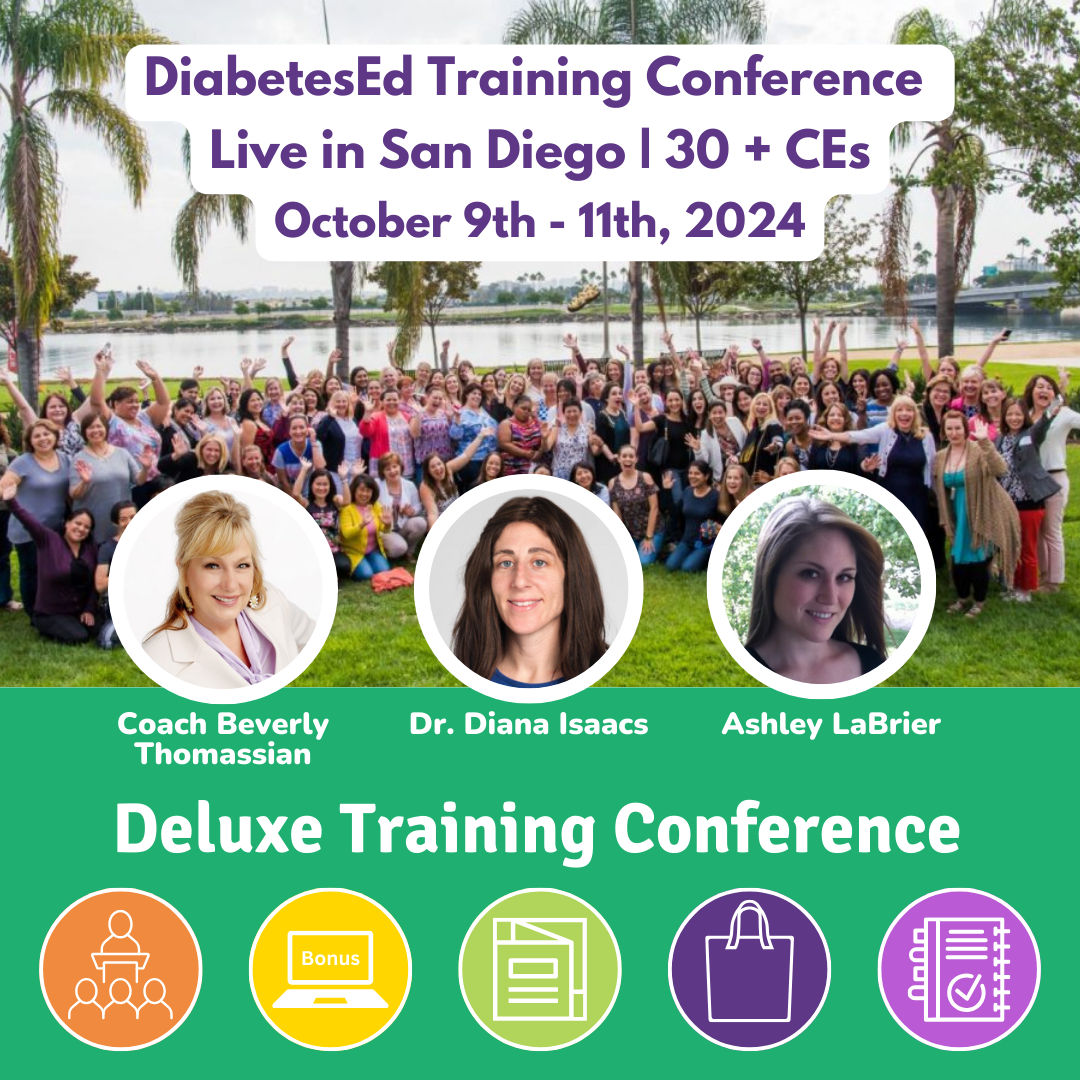
Join Coach Beverly and Team for two and a half days of knowledge-sharing, fun, networking, games with prizes, and “aha” moments in beautiful San Diego on October 9-11, 2024.
You don’t want to miss this one-of-a-kind learning opportunity. Get away from all those daily responsibilities and immerse yourself in a fun and intensive conference with plenty of networking opportunities.
Attendees will leave this conference with new tools and a more complete understanding of the latest advances in diabetes care, from medications to technology to Medical Nutrition Therapy!
Each day, we provide a healthy breakfast, including fresh coffee, to kick off your morning. Our instructors co-teach the content to keep things fresh and lively. Plus, we play DiaBingo to reinforce key content and give away prizes. In addition, we provide plenty of movement breaks led by volunteers from the audience. Did we mention delicious lunches and a conference meeting space just minutes from San Diego Bay?
Friend Discount: 3 or more only $559-$799 (based on registration package) per person. Email us at [email protected] with the name and email of each registrant to get the discount!

Time: The course is Wednesday through Friday. Join us for breakfast at 7:00 a.m. each day. The class begins at 8:00 a.m. and ends at 5:00 p.m. on Wednesday and Thursday and at 3:00 p.m. on Friday.
Accreditation: Diabetes Education Services is an approved provider by the California Board of Registered Nursing, Provider 12640, and our CPEU courses have received Prior Approval* from the Commission of Dietetic Registration (CDR), Provider DI002. Since our CPEU courses received Prior approval* from the CDR, these CPEU courses satisfy the CE requirements for the CDCES /BC-ADM regardless of your profession!
The use of DES products does not guarantee the successful passage of the certification exam. CBDCE and ADCES do not endorse any preparatory or review materials for the CDCES or BC-ADM exams, except for those published by CBDCE & ADCES.
 Once weekly basal insulin, icodec, failed to be approved for use by people with type 1 diabetes by the FDA’s Endocrinologic and Metabolic Drugs Advisory Committee by a vote of 7-4. The significantly increased risk for hypoglycemia on days two through four after administration outweighed its potential benefits. The committee also noted that icodec’s risk of hypoglycemia is higher than the basal insulin degludec, which is commonly used and has a better safety profile. Other committee members expressed concerns that approving icodec based on inadequate data could discourage further trials that are needed to ensure its safe use.
Once weekly basal insulin, icodec, failed to be approved for use by people with type 1 diabetes by the FDA’s Endocrinologic and Metabolic Drugs Advisory Committee by a vote of 7-4. The significantly increased risk for hypoglycemia on days two through four after administration outweighed its potential benefits. The committee also noted that icodec’s risk of hypoglycemia is higher than the basal insulin degludec, which is commonly used and has a better safety profile. Other committee members expressed concerns that approving icodec based on inadequate data could discourage further trials that are needed to ensure its safe use.
In an effort to secure approval, the applicants for icodec suggested the following actions to improve the safety profile of this novel weekly insulin.
Proposed mitigating actions to reduce hypoglycemia risk by the applicant included;
Even though mitigating actions were suggested to decrease this hypoglycemia risk during this two day peak, the FDA panel members still deferred approval, citing safety concerns due to the significant hypoglycemia risk and need for more data..
Surprisingly, about one third of people living with type 1 diabetes are still managing blood sugars with multiple daily injections. This is especially true for people living in under resourced communities and people of color living with type 1 diabetes. Due to barriers and social determinants of health, in addition to struggling with multiple daily injections, they are also less likely to use continuous glucose monitors or check blood sugars on a regular basis. Although, once a week insulin seems ideal for individuals who may be experiencing a variety of barriers to injecting daily insulin, the main issue is the increased risk of hypoglycemia during days 2-4 when icodec is peaking coupled with limited access to glucose monitoring.
In addition, consistent injected insulin therapy in adults with type 1 diabetes was reported to be relatively low (52.6%, 95% confidence interval[CI]: 37.4 to 67.9%) in data from a meta-analysis of eight clinical trials. The probability of missing at least one daily basal insulin dose over any 14-day period is estimated to be 22% (95% CI: 10 to 40%).
Among individuals with type 2 diabetes, using a daily basal insulin, a once weekly basal insulin would reduce the number of insulin injections from 365 per year to 52 per year. In a recent study, 91% of people with type 2 diabetes and 89% of providers had a positive view of taking basal insulin once weekly.
Among individuals with type 1 diabetes, who rely on a basal bolus regimen, a once weekly basal insulin would reduce the number of insulin injections from approximately 28 per week to 22 per week. For those with type 1 diabetes, there is no research to date that evaluates whether a once weekly basal insulin would be preferred over other basal insulin options, or whether use would result in improved adherence and glycemic control.
In ONWARDS 6, weekly insulin icodec was noninferior (but not superior) to daily insulin degludec and was associated with 48 to 89% more level two and three hypoglycemia at Week 26, depending on the method of analysis. The highest risk period for hypoglycemia with insulin icodec coincides with its peak glucose-lowering effect which occurs on days 2 to 4 following each weekly injection. There were also more hypoglycemia-related serious adverse events reported among patients randomized to insulin icodec compared to insulin degludec.
Thus, in the only study conducted in participants with type 1 diabetes, insulin icodec was observed to have a higher risk of clinically meaningful hypoglycemia, in the absence of a lower A1C. Hypoglycemic episodes reported with insulin icodec and insulin degludec in ONWARDS 6 were of the same nature in terms of duration, management, and recovery.
Insulin icodec is an acylated long-acting human insulin analog produced by a process that includes expression of recombinant DNA in yeast (Saccharomyces cerevisiae), followed by chemical modification. In addition to amino acid sequencing changes, a C20 fatty-acid side chain has been added to the peptide backbone via the amino group in the side chain at Lys(B29). When insulin icodec is injected, the C20 fatty acid sidechain derivative binds strongly, but reversibly, to endogenous albumin, which results in decreased renal clearance and protection from metabolic degradation, and consequently prolonged pharmacodynamic activity.
Insulin icodec is a proposed insulin analog with a prolonged duration of action intended to support once weekly (QW) subcutaneous administration. Thus, insulin icodec reduces treatment burden in type 1 diabetes, by reducing the number of basal insulin injections in comparison to daily basal insulins.
However,basal insulin icodec does not have a peakless time-action profile throughout the dosing interval (see chart below).
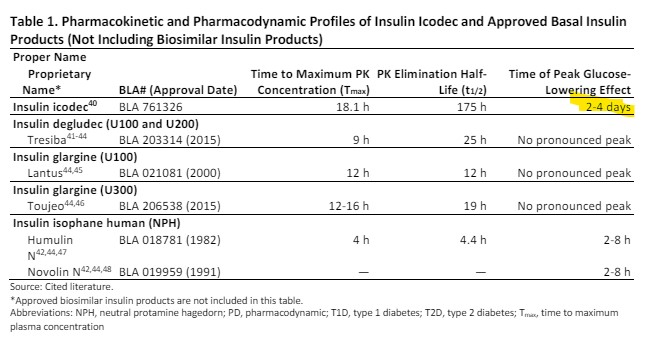
In conclusion, it seems certain that the manufacturers of insulin icodec will be seeking approval for this once weekly insulin for people living with type 1 and type 2 diabetes in the future. Stay tuned for more insulin updates with our monthly newsletter.
Information from this article was obtained from review of the FDA Presentation Document and Slides, May 24, 2024.
Accreditation: The Diabetes Educator Live Course is approved for 26 Contact Hours for nurses and CA Pharmacists and 21 CPE, Level III for RDs. Provider is approved by the California Board of Registered Nursing, Provider # 12640 and Commission on Dietetic Registration (CDR), Provider # DI002. Need hours for your CDCES? We have great news. This program is accredited by the CDR so all hours of instruction can be used to renew your CDCES regardless of your profession. **
The use of DES products does not guarantee the successful passage of the diabetes certification exams. CBDCE & ADCES does not endorse any preparatory or review materials for the certification exams, except for those published by CBDCE & ADCES.
**To satisfy the requirement for renewal of certification by continuing education for the Certification Board for Diabetes Care & Education (CBDCE), continuing education activities must be applicable to diabetes and approved by a provider on the CBDCE List of Recognized Providers (www.cbdce.org). CBDCE does not approve continuing education. Diabetes Education Services is accredited/approved by the Commission of Dietetic Registration which is on the list of CBDCE Recognized Providers.
As a Diabetes Educator who participated in the EMBARK trial, I have first-hand experience with the three different approaches used in this study to address diabetes distress and glucose levels for adults living with type 1 diabetes. I am surprised by the findings and excited to share them.
But before I describe the study and its results, there is a spoiler alert—the research results might compel you to adjust your practice approach.
The EMBARK (Behavioral Approaches to Reducing Diabetes Distress and Improving Glycemic Control) study was a 12-month randomized, controlled intervention trial for adults with type 1 diabetes. It directly compared the impact of three highly focused interventions designed to reduce both Diabetes Distress and A1C levels among adults with Type 1 Diabetes.
The trial divided participants into three groups: Streamline, FixIt, and TunedIn. As a diabetes educator, I participated in the Streamline and FixIt study groups. As part of the study protocol, each participant completed the Diabetes Distress Scale and the results were shared with the study facilitators.
As a diabetes educator involved in the Streamline and FixIt groups, I was sure that the FixIt group would have the best outcomes, given that they received the “Rolls-Royce” of interventions, which included several group sessions and one-on-one coaching by a team of psychologists and diabetes educators. However, I was wrong. The psychologist-led “TunedIn” had the best overall outcomes.
The findings suggest the value of using emotion-focused strategies, like those in TunedIn, to reduce diabetes distress and enhance management among adults with diabetes. In truth, the findings reveal that all three groups experienced improvement in A1C and Diabetes Distress. These results suggest that both management- and emotion-focused group programs for adults with type 1 diabetes can lead to significant and clinically meaningful reductions in Diabetes Distress and A1C.
As healthcare professionals, we tend to focus on problem-solving around lifestyle, medications, and glucose levels. The results of this study confirm our intuition to prioritize addressing emotions to support individuals living with diabetes.
Let’s reprioritize our checklist of diabetes topics and move into the heart of providing effective diabetes care by assessing and addressing distress.
This emotion-based approach aligns with the 2024 American Diabetes Standards, which recommend annually assessing Diabetes Distress. These important study results remind and prompt us to assess and address Diabetes Distress to improve diabetes care outcomes. The ADA created a wonderful resource, the ADA Behavioral Health Toolkit, which houses diabetes distress and other screening tools for easy reference.
The year I spent coaching study participants in the Embark Trial significantly changed my approach to diabetes self-management coaching. In preparation for the study intervention, we were fortunate to be mentored by two experts in the field of diabetes distress: Susan Guzman, PhD, and Larry Fisher, PhD. Their wisdom and role-modeling of empowering individuals to discover new approaches to self-management were truly remarkable.
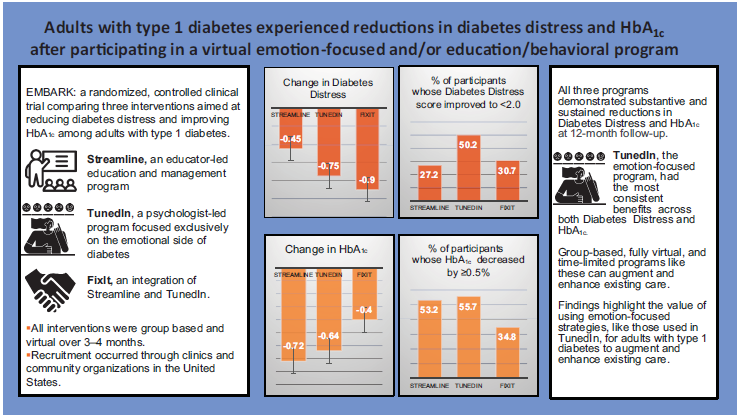
Danielle M. Hessler, Lawrence Fisher, Susan Guzman, Lisa Strycker, William H. Polonsky, Andrew Ahmann, Grazia Aleppo, Nicholas B. Argento, Joseph Henske, Sarah Kim, Elizabeth Stephens, Katherine Greenberg, Umesh Masharani; EMBARK: A Randomized, Controlled Trial Comparing Three Approaches to Reducing Diabetes Distress and Improving HbA1c in Adults With Type 1 Diabetes. Diabetes Care 2024; dc232452. https://doi.org/10.2337/dc23-2452
If you are interested in providing a FREE Diabetes Distress program led by a team of experts for the health care professionals in your facility, Please download this Diabetes Distress Flyer for more info!

Accreditation: Diabetes Education Services is an approved provider by the California Board of Registered Nursing, Provider 12640, and our CPEU courses have received Prior Approval* from the Commission of Dietetic Registration (CDR), Provider DI002. Since our CPEU courses received Prior approval* from the CDR, these CPEU courses satisfy the CE requirements for the CDCES /BC-ADM regardless of your profession!
The use of DES products does not guarantee the successful passage of the certification exam. CBDCE and ADCES do not endorse any preparatory or review materials for the CDCES or BC-ADM exams, except for those published by CBDCE & ADCES.
This two-session training provides the essential steps to address diabetes distress combined with an innovative approach to helping people make sense of their glucose data.
The first session is team-taught by experts in the field of diabetes distress and effective communication approaches. Dr. Larry Fisher kicks off the program by describing the difference between depression and distress and interpreting Diabetes Distress screening results. Dr. Susan Guzman uses a case study approach and step-by-step communication strategies to address responses from the Diabetes Distress screening tool. This session includes an abundance of evidence-based approaches that you can apply in your clinical setting.
Coach Beverly leads the second session. During this three-hour program, Beverly describes insulin dosing strategies, meter and sensor data interpretation, and common issues encountered by people using diabetes technology. Case studies include tools to help individuals discover what changes are needed to get glucose to target, coupled with the communication skills discussed in the first session. In conclusion, the team of instructors review a case study that pulls together all the ReVive 5 elements.
Can’t join live? That’s okay. Your registration guarantees you access to the recorded version of the series, along with podcasts and resources for one full year.
Accredited Training Program:
Team of Experts:
ReVive 5 is taught by a team of 3 Interdisciplinary Experts:
The use of DES products does not guarantee the successful passage of the certification exam. CBDCE and ADCES do not endorse any preparatory or review materials for the CDCES or BC-ADM exams, except for those published by CBDCE & ADCES.